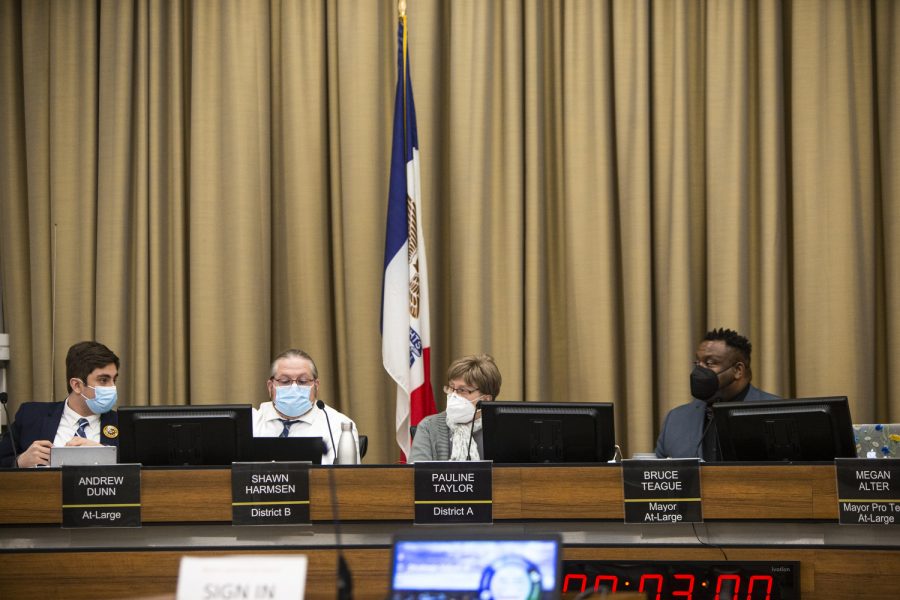Iowa City City Council denies W. Benton and Orchard Streets rezoning after community input
A lengthy discussion over the rezoning land by West Benton Street and west of Orchard Street has ended after a community member petition stopped the continuation of construction plans.
City council members communicate during an Iowa City City Council meeting at City Hall on Jan. 24, 2023.
February 8, 2023
Iowa City residents filed a petition and won Tuesday to stop the Iowa City City Council’s consideration to rezone land north of West Benton Street and west of Orchard Street.
Following the council’s decision to defer the matter during its Jan. 24 meeting, the council received a petition with enough signatures to require a super-majority vote. At least six council members needed to vote in the affirmative to pass the consideration.
Councilors Pauline Taylor, Andrew Dunn, and John Thomas voted in opposition, blocking the ordinance from any further consideration.
Ginny Rew, a West Benton Street resident, spoke before the council on Tuesday, expressing her concern that the 189 proposed units for the development on the site would impact the traffic in the surrounding area.
“I feel like it’s going to destroy our neighborhood,” Rew said. “It’s going to increase traffic on Benton, Orchard, Miller, and Hudson.”
During the council’s discussion, Councilor Pauline Taylor agreed with Rew’s worries.
“This proposal for rezoning and potential development raises many concerns for me, the most disturbing of which is the question of safety at that intersection,” Taylor said.
Taylor also mentioned her opposition to the rezoning because of the transition’s size.
“My understanding of a transition zone is one that moves smoothly from the larger scale, mixed-use corridor to adjacent single-family homes and should be scaled appropriately,” Taylor said. “I do not see that smooth transition in this plan.”
Councilor Andrew Dunn agreed with Taylor’s thoughts on the transition and said he was concerned with the size and scale of the development.
“It is my judgment that the multi-dwelling building that is proposed here, and the subsequent rezoning that is being requested to create that, does not align in mass scale or is complementary to the surrounding single-family homes,” Dunn said.
Mayor Pro-Tem Megan Alter voted to move forward with the consideration, explaining that despite the community backlash, she believed the developers were attempting to address the neighborhood’s concerns.
“I will be supporting this, not out of a lack of compassion or understanding that change is hard and that this not the way that you’re envisioning this, but I will say in having listened to a lot of meetings by developers, it sounds like in over six months, there has been a lot of intense work to take feedback from neighbors,” Alter said.
Alter added that the development could update the housing options available to students on the west side.
Councilor Laura Bergus also supported the ordinance, explaining that her familiarity with the area allows her to believe that the changes to the community will not be as problematic as initially assumed.
“I believe that … the neighborhood character that was spoken of will not be destroyed if a few extra cars park on the street,” Bergus said.
Bergus said she sympathized with the concern, but noted that many of the issues brought up by the community, especially regarding density, are already commitments of the city.
“I understand the fear, I understand the concern of change in the neighborhood, but we have committed to density … we have committed to walkability … we have committed to areas being accessible for all kinds of people,” Bergus said. “I just feel like it’s not consistent with what we’ve committed to for the community as a whole if we don’t allow a project like this to go forward.”
Despite more councilors voting in favor of passing the first consideration of the ordinance, the community’s petition ultimately decided the ordinance’s future.



